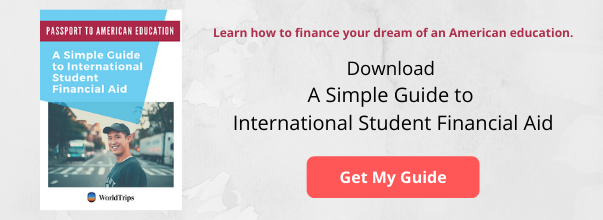College is said to be one of the most exciting times in your life. It’s an opportunity for you to discover your passions, expand on your skills, and learn more about yourself.
This period of self-discovery is even more beneficial to Indian students seeking to study abroad in the United States. The number of Indian students studying in the U.S. has grown exponentially at a rate of 12%, which is one of the highest growth rates in the world. This significant increase is due to the sound educational programs and opportunities offered in the U.S.
Read on to uncover five reasons why studying in the USA will not only aid in your academic success but your personal endeavors as well.
1. Abundance of Opportunity
It’s no secret that the U.S. is a popular world study destination for Indian students. This is largely due to the abundance of opportunity which awaits you in the U.S. Opportunities for international students include:
Endless Degree Options
The United States has numerous prestigious universities all over the country that offer unique, specific degree programs that fit all areas of interest. Whether you’re passionate about business, law, or art, there is a university and degree program perfectly suited to you.
Listed Below Are the Top 5 Universities for Each Degree Program:
Business
The following schools were assessed based on standards of admission, academic experiences, and post-employment opportunities for graduates.
- University of Pennsylvania
- Washington University in St. Louis
- University of Virginia
- University of Notre Dame
- Georgetown University
Engineering
The following schools were evaluated based on the highest earning potential for students after graduation.
- California Institute of Technology
- Massachusetts Institute of Technology
- Stanford University
- Georgia Institute of Technology
- Harvard University
Medicine
The following schools were selected based on curriculum difficulty, clinical opportunities and advising services offered, and the history of the school’s program.
- Harvard University
- Johns Hopkins University
- Stanford University
- University of Pennsylvania
- Columbia University
Liberal Arts
The following schools were evaluated based on the earning potential of graduates.
Education
The following schools were weighed based on acceptance rate, education program popularity, graduation rate, retention rate, and affordability.
- Brigham Young University
- University of Georgia
- University of Maryland
- University of Central Florida
- Purdue University
Law
The following schools were judged on their full law programs, graduation rates, networking opportunities, and affordability.
- Michigan State University
- Nova Southeastern University
- Northern Arizona University
- University of Maryland
- The City College of New York
Large Variety of Classes Offered
Coming to the U.S. to study means you’ll have a wide variety of options to choose from when deciding on a major. Take a variety of courses to pinpoint your area of interest and determine where your passions lie. Each major encompasses a strict list of required classes, but you have the option to choose from an array of electives.
Electives do not have to be related to your major and are often consistent with a more relaxed course load. So take some fun classes and get credit while doing it!
Did you know that U.S. colleges offer electives like Introduction to Wines, Furniture Making, and How to Win a Beauty Pageant?
Numerous Opportunities to Get Involved in Your Desired Field
Many campuses hold multiple job fairs and special events throughout the year. Take advantage of these free opportunities to learn, network, and build relationships.

Each academic program and school also offers career-related projects and internships that will provide you with real-world experiences, making you more valuable to employers.
To prepare for these openings, seek out staff members that are willing to help you by practicing mock interviews, aiding your job search, and assisting with resume and cover letter revisions.
High Acceptance Rate
In addition to offering successful degree programs and helpful resources, universities in the United States want international students to study here.
Every year, the U.S. accepts a high number of international applications. In fact, over 186,000 Indian students studied abroad in the U.S. during the 2016-17 school year.
Here Are the Top 5 Schools with the Most International Students (2016-2017):
- New York University - 17,326
- University of Southern California - 14,327
- Columbia University - 14,096
- Northeastern University - 13,201
- Arizona State University-13,164
A Few Tips:
- Make your experience abroad more fun and enjoyable by choosing a university that fits your needs and goals. Check out this blog titled “How to Choose a College or University in the U.S.” to determine the perfect college for you – based on your budget and personality.
- Don’t be afraid to ask your advisors and professors for help. They can assist you in finding career opportunities that will not only add value to your resume but enhance your overall experience abroad.
- Never pass up a networking opportunity. Networking can be nerve-wracking, but it helps you build relationships with individuals in your desired career field. Establishing a relationship can help you later on when you are applying for full-time employment. The more you put yourself out there, the less nervous you will become.
2. The U.S. Higher Education System is Held in High Regard
If having some of the top universities and degree programs in the world doesn’t make you want to study abroad in the U.S., maybe the following reasons will:
Access to Cutting-Edge Technology
Universities in the U.S. have highly accredited professors and access to advanced technology. Pursuing a degree concentrated on research, such as biology, will give you the opportunity to participate in research projects for pay, learn from professionals in the field, as well as have your work published.
Embracing these opportunities provides a hands-on learning environment, and it will give you a leg up on your peers with similar career aspirations.
A Leader in Science and Engineering
If you want to study science or engineering, there’s no better place to study than in the USA. The U.S. invests a large amount of money into research, therefore producing the most well-renowned science and degree programs in the world.
A Few Tips:
- Don’t worry about knowing exactly what you want to study as soon as you land in the states. It’s okay not to know. In fact, a study of 25,000 students enrolled in bachelor’s degree programs in the U.S. found that 30% of students changed their major within three years of their initial enrollment. So take some classes and experiment. But remember to have fun, too!
- Choosing a major isn’t always easy, especially with the array of choices out there. Take this quiz from Loyola University to help narrow your options. The assessment will provide recommended courses of study depending on your interests.
3. Substantial Financial Support Is Available
While studying abroad in the U.S. can be costly, there are grants, scholarships, and loans that you can apply for to help alleviate the financial burden. Plus, international students can work part-time in the U.S.!

Scholarships and Grants
When it comes to applying for scholarships and grants, you must be diligent. They take time to find and even more time to complete.
But scholarships and grants do not have to be paid back, so apply for as many as you can. Just make sure you fit the requirements before filling out an application.
Websites such as IndiaEducation include scholarships that are available exclusively to Indian students, and Top Universities offers scholarships only to those interested in certain degree programs and universities.
Watch out for deadlines and begin your search well in advance.
Loans and Financial Aid
As an international student, you are ineligible for federal student loans, but private loans are available. However, it’s best to use other payment methods if possible. This will help you avoid high-interest payments after graduation.
While non-citizens are not eligible to receive federal student aid, your prospective school may ask you to fill out a federal student aid (FASFA) application anyway. The school may use this form to assess whether you are eligible to receive financial aid from the school itself.
Work Opportunities
If you want a little extra money in your pocket, you do have the opportunity to work a part-time job. As an international student with an F-1 visa, you are allowed to work up to 20 hours per week. However, the job you hold must fall under one of the four categories of off-campus employment available to you.
A Few Tips:
- Look for financial aid information on your school’s website. Here you may find specific prices for expenses as well as scholarship opportunities.
- Read the requirements for your visa very carefully. You are required to abide by the rules of your visa when working in the U.S.
- Learn more about how to work in the U.S. on a student visa here.
How Much Does It Cost to Study Abroad in the United States?
According to College Board, these were the average costs for out-of-state undergraduates at public four-year colleges during the 2017-18 school year:
- Tuition – $25,620
- Housing and Meals – $10,800
- Books and Supplies – $1,250
According to College Board, these were the average costs for private, four-year colleges during the 2017-18 school year:
- Tuition - $34,740
- Housing and Meals - $12,210
- Books and Supplies - $1,220
Learn more about the cost of studying in the United States by downloading our Passport to American Education: A Simple Guide to International Student Financial Aid.
4. Cultural Diversity
Traveling to a new country to study is often intimidating and overwhelming. But it doesn’t have to be. Diving into unfamiliar cultures and territories can be one of the most exhilarating and enjoyable experiences of studying abroad.
Exposure to New Cultures
As one of the most diverse nations, the U.S. is overflowing with different ethnic groups, languages, and religions. Studying abroad in the U.S. gives you the opportunity to immerse yourself in these cultures to gain new perspectives.
Developing a different mindset will not only allow you to better understand other cultures, but it will allow for lasting relationships to form.
However, it is important to note that relationships cannot form unless both parties establish mutual respect and display a willingness to learn without ethnocentrism.
Forces You Out of Your Comfort Zone
Being exposed to a new culture can be scary because you’re in unfamiliar territory. So, what should you do? Make it familiar by stepping out of your bubble!

Actively doing this will allow you to learn new things while building your confidence. Moreover, participating in active learning challenges your growth, creativity, and opens endless doors of possibilities.
As author Manoj Arora famously said, “Coming out of your comfort zone is tough in the beginning, chaotic in the middle, and awesome in the end… because in the end, it shows you a whole new world.”
A Few Tips:
- Do your research. Familiarize yourself with American culture before you leave your home country. Understand basic phrases, culture, and laws to better prepare yourself for what to expect when you land. Check out this guide to U.S. Cultures and Customs for everything you need to know as a USA visitor – from American values and social etiquette to options regarding transportation and food.
- Even though it can be challenging, put yourself out there. Attend club meetings, reach out to classmates on social media, and converse with locals every time you’re out and about.
5. Professional Development
Not only can studying abroad in the U.S. aid personal growth, but taking full advantage of this opportunity can catapult you to professional success.
Language Improvement
With all the time you will be spending in America, it’s likely that you’ll have to converse in English at certain points during your stay. Because of this, your English speaking and comprehension skills will quickly improve.
So, what does this mean for your professional career? Over 1.75 billion people speak English at a useful level. English is the global language of business, and possessing a proficient vocabulary and comprehension of the language will make you even more valuable to an employer.
In fact, companies such as Nokia and Samsung have mandated English as the common corporate language.
Possessing and displaying a full understanding of the English language can lead to you obtaining your dream job and gaining quicker promotions. After all, communication is a key component of any position.
Higher Value
Global companies recognize that an understanding of American culture is highly beneficial to their business. Because of this, international employers highly value U.S. degrees, as well as degrees pertaining to international studies.
A Few Tips:
- Don’t be afraid to ask for help if you have trouble learning American sayings or phrases.
- The only way to learn is to practice. Practice mock interviews and speaking to expand your knowledge of the English language.
- Utilize online language programs and translation apps before you go.





